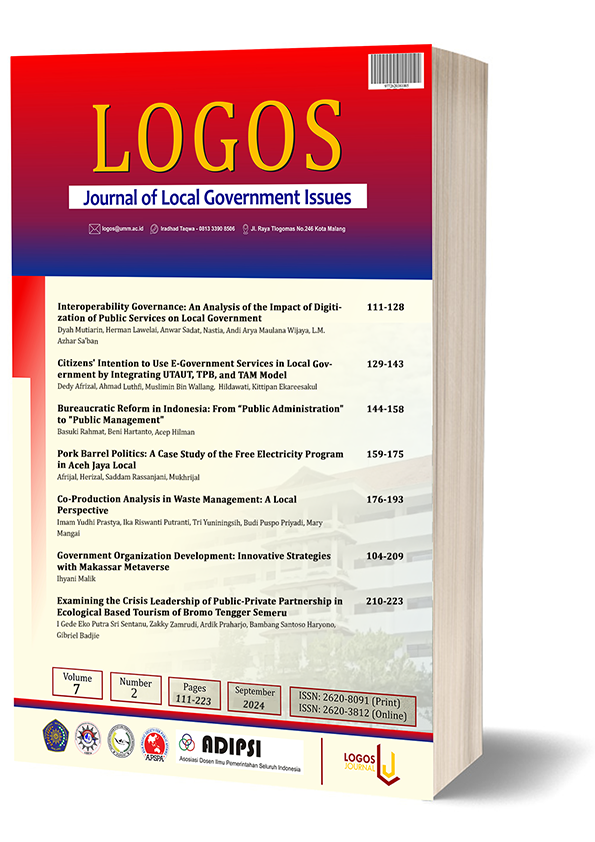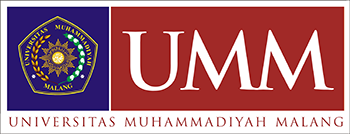Government Organization Development: Innovative Strategies with Makassar Metaverse
DOI:
https://doi.org/10.22219/logos.v7i2.32177Keywords:
government digitalization, metaverse, organizational developmentAbstract
Organizational development in the digital era requires innovative steps in adopting technology to maintain organizational sustainability and resilience . As an innovative step that attracts attention, using Makassar Metaverse as a platform is a strategic choice to strengthen the organization's position in the digital ecosystem. The purpose of this article is to present comprehensive research results, focusing on the concept of digital-based organizational development through the application of the Makassar Metaverse. The research method applied is quantitative with big data analysis to describe the impact and potential of this innovation on government organizations. The research results indicate that there are several challenges that need to be overcome, such as limited accessibility to government websites and the level of community involvement that is not yet optimal on government social media accounts. Nevertheless, the Makassar Metaverse innovation brings significant changes in the context of government organizational development. This initiative encourages information disclosure by the government and creates wider participation space for the public in the decision-making process of government organizations. Thus, this article illustrates how important Metaverse digital innovation is in supporting organizational transformation into an increasingly complex digital era.
Downloads
References
A’yun, L. Q., & Hartaman, N. (2021). Evaluation of E-Budgeting Implementation in Planning Budget in Maros Regency. Journal of Government and Political Issues, 1(2), 65–72. https://doi.org/10.53341/jgpi.v1i2.22
Allam, Z., Sharifi, A., Bibri, S. E., Jones, D. S., & Krogstie, J. (2022). The Metaverse as a Virtual Form of Smart Cities: Opportunities and Challenges for Environmental, Economic, and Social Sustainability in Urban Futures. Smart Cities, 5(3), 771–801. https://doi.org/10.3390/smartcities5030040
Armbrust, V. (2022). The Metaverse Holds Big Opportunities for the Public Sector. Route Fifty.
Avita, D. N., Aditya, R., Fakhrudin, A., Tohir, N. I., & Anshori, M. I. (2023). Maximizing Strategies For Developing Business In The Digital Transformation Era. Gudang Jurnal Multidisiplin Ilmu, 1(4), 56–61.
Bibri, S. E. (2022). The Social Shaping of the Metaverse as an Alternative to the Imaginaries of Data-Driven Smart Cities: A Study in Science, Technology, and Society. Smart Cities, 5(3), 832–874. https://doi.org/10.3390/smartcities5030043
Bibri, S. E., & Allam, Z. (2022). Correction: The Metaverse as a Virtual Form of Data-Driven Smart Urbanism: On Post-Pandemic Governance through the Prism of the Logic of Surveillance Capitalism (Smart Cities (2022), 5, (715-727), 10.3390/smartcities5020037). Smart Cities, 5(4), 1241–1242. https://doi.org/10.3390/smartcities5040063
Chatra, E., & Havifi, I. (2021). Application of Collaborative Learning Method: Interactive and Online Learning to Improve Effective Communication Based on Online Media and Website Government Public Relations Learning. Proceedings of the 3rd International Conference on Educational Development and Quality Assurance (ICED-QA 2020), 506, 489–494. https://doi.org/10.2991/assehr.k.210202.085
Choirunnisa, L., Oktaviana, T. H. C., Ridlo, A. A., & Rohmah, E. I. (2023). Peran Sistem Pemerintah Berbasis Elektronik (SPBE) Dalam Meningkatkan Aksesibilitas Pelayanan Publik di Indonesia. Sosio Yustisia: Jurnal Hukum Dan Perubahan Sosial, 3(1), 71–95. https://jurnalpps.uinsby.ac.id/index.php/sosioyustisia/article/view/401
Distor, C., Dhaou, S. Ben, & Nielsen, M. M. (2023). Metaverse vs. metacurse: The role of governments and public sector use cases. CEUR Workshop Proceedings, 3449.
Fadhila, S. N. (2022, March 15). Konsep Metaverse Butuh Kajian, Pemkot Makassar Dinilai Tergesa-gesa. Sindo News. https://daerah.sindonews.com/read/713591/710/konsep-metaverse-butuh-kajian-pemkot-makassar-dinilai-tergesa-gesa-1647345790
Fajriyani, D., Fauzi, A., Devi Kurniawati, M., Yudo Prakoso Dewo, A., Fahri Baihaqi, A., & Nasution, Z. (2023). Tantangan Kompetensi SDM dalam Menghadapi Era Digital (Literatur Review). Jurnal Ekonomi Manajemen Sistem Informasi, 4(6), 1004–1013. https://doi.org/10.31933/jemsi.v4i6.1631
Frach, L., Fehrmann, T., & Pfannes, P. (2016). Measuring Digital Government: How to Assess and Compare Digitalisation in Public Sector Organisations. Digital Government, 6(2), 25–38. https://doi.org/10.1007/978-3-319-38795-6_2
Gasanov, O. S. (2022). The impact of digitalization on the Russian economy. Finance and Credit, 28(7), 1534–1553. https://doi.org/10.24891/fc.28.7.1534
Hai, T. N., Van, Q. N., & Tuyet, M. N. T. (2021). Digital transformation: Opportunities and challenges for leaders in the emerging countries in response to covid-19 pandemic. Emerging Science Journal, 5(Special Issue), 21–36. https://doi.org/10.28991/esj-2021-SPER-03
Hamka. (2022, March 15). Pakar IT ITB Sebut Makassar Belum Layak Menuju Kota Metaverse. Fajar. https://fajar.co.id/2022/03/15/pakar-it-itb-sarankan-perbaikan-infrastruktur-menuju-kota-metaverse/
Han, S. (2011). Privacy in Context: Technology, Policy, and the Integrity of Social Life. In Journal of Information Policy (Vol. 1, Issue 1). Stanford University Press. https://doi.org/10.5325/jinfopoli.1.2011.149
Hoerudin, C. W. (2020). Adaptive Leadership in Digital Era: Case Study of Ridwan Kamil. CosmoGov, 6(1), 89. https://doi.org/10.24198/cosmogov.v6i1.26793
Imran, F., Shahzad, K., Butt, A., & Kantola, J. (2021). Digital Transformation of Industrial Organizations: Toward an Integrated Framework. Journal of Change Management, 21(4), 451–479. https://doi.org/10.1080/14697017.2021.1929406
Ingrams, A., Manoharan, A., Schmidthuber, L., & Holzer, M. (2020). Stages and Determinants of E-Government Development: A Twelve-Year Longitudinal Study of Global Cities. International Public Management Journal, 23(6), 731–769. https://doi.org/10.1080/10967494.2018.1467987
Ismail, A., Hidajat, T., Dora, Y. M., Prasatia, F. E., & Pranadani, A. (2023). Leading the Digital Transformation: Evidence from Indonesia. Asadel Publisher. https://books.google.com/books?hl=en&lr=&id=tCbPEAAAQBAJ&oi=fnd&pg=PA7&dq=quality+of+service+bank+jateng+syariah&ots=ogq73vyWAr&sig=4FV6edgJjo2W64QsKVf168WVj3I
Janowski, T. (2015). Digital government evolution: From transformation to contextualization. In Government Information Quarterly (Vol. 32, Issue 3, pp. 221–236). Elsevier. https://doi.org/10.1016/j.giq.2015.07.001
Khoiri, M. (2020). Visionary Leadership on Transforming Organizational Change in the Era of Disruption. International Journal of Multicultural and Multireligious Understanding, 7(10), 490–495. https://ijmmu.com/index.php/ijmmu/article/view/2053
Lamirin, Santoso, J., & Selwen, P. (2023). Penerapan Strategi Kepemimpinan Transformasional dalam Meningkatkan Kinerja Organisasi Pendidikan. Jurnal Ilmiah Kanderang Tingang, 14(2), 400–409. https://doi.org/10.37304/jikt.v14i2.259
Lnenicka, M., Rizun, N., Alexopoulos, C., & Janssen, M. (2024). Government in the metaverse: Requirements and suitability for providing digital public services. Technological Forecasting and Social Change, 203, 123346. https://doi.org/10.1016/j.techfore.2024.123346
Li, C., Feng, W.-X., Han, S., Gupta, S., & Kamble, S. (2022). Digital Adaptive Governance, Digital Transformation, and Service Quality in Logistics Enterprises. Journal of Global Information Management, 30(1), 1–26. https://doi.org/10.4018/jgim.309377
Liang, T. Y. (2015). Relativistic complexity, adaptive governance and the intelligence leadership. Human Systems Management, 34(3), 201–223. https://doi.org/10.3233/HSM-150841
Loka, D. M., Akhyar Abdullah, & Sudirman, F. A. (2022). Identifikasi Pelayanan Publik Berbasis E-Government Pemerintah Kota Kendari Pada Masa New Normal. NeoRespublica: Jurnal Ilmu Pemerintahan, 4(1), 205–218. https://doi.org/10.52423/neores.v4i1.51
Magesa, M. M., & Jonathan, J. (2022). Conceptualizing digital leadership characteristics for successful digital transformation: the case of Tanzania. Information Technology for Development, 28(4), 777–796. https://doi.org/10.1080/02681102.2021.1991872
Miceli, A., Hagen, B., Riccardi, M. P., Sotti, F., & Settembre-Blundo, D. (2021). Thriving, not just surviving in changing times: How sustainability, agility and digitalization intertwine with organizational resilience. Sustainability (Switzerland), 13(4), 1–17. https://doi.org/10.3390/su13042052
Nadkarni, S., & Prügl, R. (2021). Digital transformation: a review, synthesis and opportunities for future research. Management Review Quarterly, 71(2), 233–341. https://doi.org/10.1007/s11301-020-00185-7
Nayak, T., Kalambele, S., & Jain, A. (2023). Metaverse in Public Sector. In The Business of the Metaverse: How to Maintain the Human Element Within This New Business Reality (pp. 259–266). Productivity Press. https://doi.org/10.4324/b23404-1
Parviainen, P., Tihinen, M., Kääriäinen, J., & Teppola, S. (2017). Tackling the digitalization challenge: How to benefit from digitalization in practice. International Journal of Information Systems and Project Management, 5(1), 63–77. https://doi.org/10.12821/ijispm050104
Ramli, M., & Mahmud, A. (2023). Metaverse innovation in public service transformation in Makassar metropolitan city. Journal of Islam and Science PISSN, 10(2), 105–114. https://doi.org/doi.org/10.24252/jis.v10i2.40945
Ruban, A. (2023). The role of the government in metaverse development in China and South Korea: A Comparative Analysis. Università Ca’Foscari Venezia.
Sulsel, D. (2022, March 16). Balada Makassar Kota Metaverse, Heboh di Medsos-Masih 8 % Warga yang Tahu. Detik.Com. https://www.detik.com/sulsel/berita/d-5985341/balada-makassar-kota-metaverse-heboh-di-medsos-masih-8-warga-yang-tahu
Ud Din, I., Awan, K. A., Almogren, A., & Rodrigues, J. J. P. C. (2023). Integration of IoT and blockchain for decentralized management and ownership in the metaverse. International Journal of Communication Systems, 36(18), e5612. https://doi.org/10.1002/dac.5612
Uzun, M. M. (2023). Metaverse Governance. Studies in Big Data, 133(October 2023), 231–244. https://doi.org/10.1007/978-981-99-4641-9_16
Vial, G. (2021). Understanding digital transformation: A review and a research agenda. Managing Digital Transformation: Understanding the Strategic Process, 13–66.
Vigoda, E. (2015). FROM RESPONSIVENESS TO COLLABORATION: Governance, Citizens, and the Next Generation of Public Administration. In The Age of Direct Citizen Participation (pp. 473–490). Edward Elgar Publishing. https://doi.org/10.4324/9781315700427-27
Yaqoob, I., Salah, K., Jayaraman, R., & Omar, M. (2023). Metaverse applications in smart cities: Enabling technologies, opportunities, challenges, and future directions. Internet of Things (Netherlands), 23, 100884. https://doi.org/10.1016/j.iot.2023.100884
Yang, L. (2023). Recommendations for metaverse governance based on technical standards. Humanities and Social Sciences Communications, 10(1), 1–10. https://doi.org/10.1057/s41599-023-01750-7
Yfantis, V., & Ntalianis, K. (2023). Exploring the Potential Adoption of Metaverse in Government. In Data Intelligence and Cognitive Informatics: Proceedings of ICDICI 2022 (pp. 815–824). Springer. https://doi.org/10.1007/978-981-19-6004-8_61
Yigitcanlar, T., Corchado, J. M., Mehmood, R., Li, R. Y. M., Mossberger, K., & Desouza, K. (2021). Responsible urban innovation with local government artificial intelligence (Ai): A conceptual framework and research agenda. Journal of Open Innovation: Technology, Market, and Complexity, 7(1), 1–16. https://doi.org/10.3390/joitmc7010071
Zaki, M. (2019). Digital transformation: harnessing digital technologies for the next generation of services. Journal of Services Marketing, 33(4), 429–435. https://doi.org/10.1108/JSM-01-2019-0034
Ziadlou, D. (2021). Strategies during digital transformation to make progress in achievement of sustainable development by 2030. Leadership in Health Services, 34(4), 375–391. https://doi.org/10.1108/LHS-08-2020-0056
Downloads
Published
How to Cite
Issue
Section
License
Copyright (c) 2024 Ihyani Malik

This work is licensed under a Creative Commons Attribution-ShareAlike 4.0 International License.
Authors who publish with this journal agree to the following terms:
- Authors retain copyright and grant the journal right of first publication with the work simultaneously licensed under a Creative Commons Attribution-ShareAlike 4.0 International License. that allows others to share the work with an acknowledgment of the work's authorship and initial publication in this journal.
- Authors are able to enter into separate, additional contractual arrangements for the non-exclusive distribution of the journal's published version of the work (e.g., post it to an institutional repository or publish it in a book), with an acknowledgment of its initial publication in this journal.
- Authors are permitted and encouraged to post their work online (e.g., in institutional repositories or on their website) prior to and during the submission process, as it can lead to productive exchanges, as well as earlier and greater citation of published work (See The Effect of Open Access).

This work is licensed under a Creative Commons Attribution-ShareAlike 4.0 International License.













